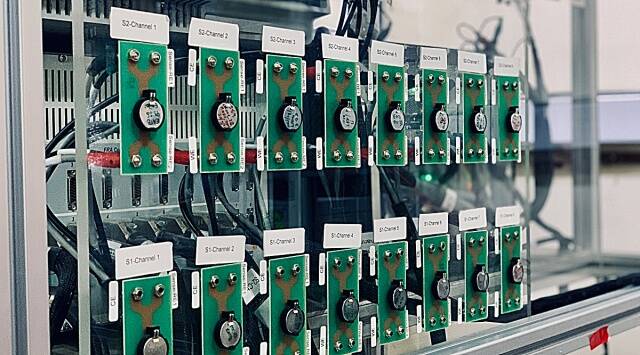Chile, the country endowed with most lithium reserves and home to SQM, the second largest global lithium producer, is keen to partner with India on tapping into the lithium value chain. This includes potentially extending technical expertise in exploiting the newly established “inferred” lithium resources of 5.9 million tonnes in Salal-Haimana area of Reasi district in Jammu and Kashmir.
“We are open (to it) if the Indian Government were to initiate anything formally,” Alex Wetzig, Secretary General, Chile’s Ministry of Foreign Affairs told The Indian Express. He had held meetings with counterparts in the Ministry of Commerce and the MEA Friday, with discussions covering cooperation in wide ranging areas including trade, technology, renewables, space, mining and education.

“Currently we have an agreement on trade of goods. And of course, we want to improve our exchange by adding services and investment in a Comprehensive Economic Partnership Agreement. We are trying to have better relations with all the markets, especially in the Asia Pacific region. And, of course, India is a very interesting market because it’s growing, the number of potential consumers,” he said.
He indicated about the possibility of tapping the expertise of Chilean lithium mining specialists being on the cards, and that companies such as SQM are likely to be open to transfer of technology to help in the exploitation of the white alkali metal, a vital ingredient of the lithium-ion rechargeable batteries that power electric vehicles (EVs), laptops and mobile phones.
“…there is a private company with the experience in this progression of lithium called SQM. They have even invested in Australia, where they have a Chilean-Australian joint venture called Covalent. They basically produce battery-grade lithium to export from Australia. So, Chile has a record of being able to help develop lithium industries in other countries… it depends on the size of the find… if the Indian Government is interested to have an expertise of a Chilean company on lithium, of course, we are open to it,” he said.
Even though the lithium found in India is of mineral type unlike salt pans in Chile, Wetzig said the Chilean company would have no problem in transferring technology to do other kinds of exploitations given that Australia, the country where it already has a joint venture, also holds lithium in mineral form.
ExplainedA technology partnership
The ‘inferred’ reserves of 5.9 mn tonnes in J&K’s Reasi are in mineral form unlike Chile’s salt pans. However, Chile-based SQM, world’s largest producer of lithium, has a venture in Australia to tap lithium in mineral form.
ExplainedA technology partnership
The ‘inferred’ reserves of 5.9 mn tonnes in J&K’s Reasi are in mineral form unlike Chile’s salt pans. However, Chile-based SQM, world’s largest producer of lithium, has a venture in Australia to tap lithium in mineral form.
Chile has around 48 per cent of the total lithium reserves in the world, contained mostly in the Salar de Atacama, a large salt flat located in the country’s north.
Story continues below this ad
Wetzig indicated that the cooperation with India on lithium would be part of a broad-based partnership in trade that Santiago is pursuing. An Indian delegation from the Ministry of Mines and NITI Aayog had visited Chile in October 2019 to attend meetings for procurement of lithium from Chile. The delegation had visited the country’s salt flats, but the initiative came to a halt after Covid struck. “So, we have the framework, and the discussions with the Indian authorities are focused on creating opportunities for companies on both sides to invest,” he said.
In March 2019, during the visit of the President of India to Chile, the Memorandum of Understanding (MoU) between Indian and Chile on cooperation in geology and minerals was renewed for five years. In 2022, there were stepped up efforts by Khanij Bidesh India Limited (KABIL), a joint venture company formed by central utilities including NALCO, HCL and MECL, to source strategic minerals from countries like Australia, Argentina and Chile. As per a government release in December 2022, KABIL is focusing on identifying and sourcing battery minerals like lithium and cobalt and engagement with a few companies is underway in Australia, Argentina and Chile.
The Geological Survey of India (GSI), an attached office of Ministry of Mines, carried out a G3 stage —fairly advanced — mineral exploration project during Field Season 2020-21 and 2021-22 in Salal-Haimna areas of Reasi district, Jammu & Kashmir and estimated an inferred resource of 5.9 million tonnes of lithium ore and the report has been handed over to the Government of the Union Territory of J&K. The estimated value of lithium at that site will be estimated on completion of further exploration.
India currently imports all its lithium needs and is almost entirely dependent on inflows of these imported cells for domestic consumption. The move to ink sourcing pacts for lithium is seen as another salvo in the front against imports from China, the major source of both the raw material and cells.










